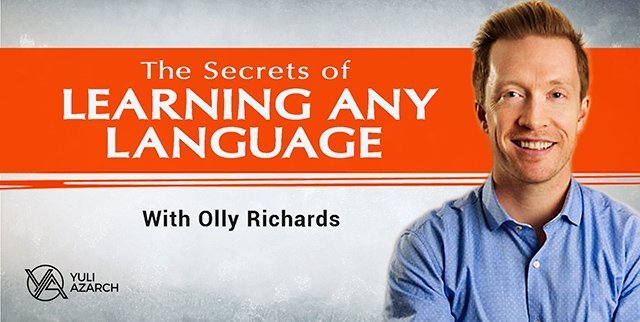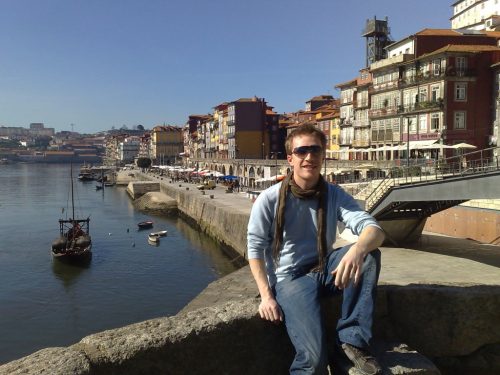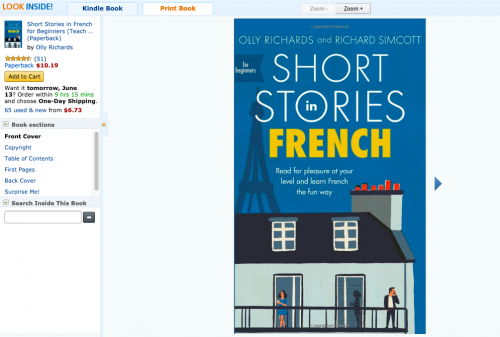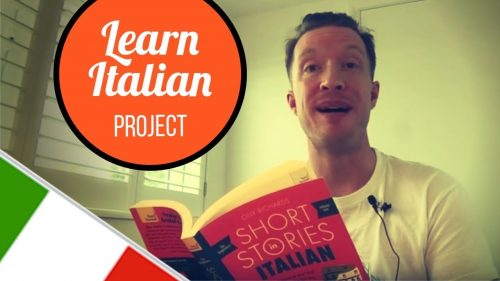The Secrets Of Learning Any Language Quickly with Olly Richards
 Yuli Azarch | June 17, 2019 | No Comments on The Secrets Of Learning Any Language Quickly with Olly Richards
Yuli Azarch | June 17, 2019 | No Comments on The Secrets Of Learning Any Language Quickly with Olly Richards

Watch the interview below:
Listen to the interview below:
“I don’t think of language learning as a travel tool anymore. Although it helps, I think of [it] as a way to improve my life, and to enhance the quality of my life, here in London. To me that’s the point of all of this, that is how I make sense of everything, and justify the effort and energy that I put into it”— Olly Richards.
Olly Richards is the founder of “I Will Teach You A Language”. He is also a world traveler and polyglot. Olly has taught himself eight languages while traveling. Olly is a language learning expert and author of multiple bestselling books.
He is also a consultant for universities, coach for ambassadors, an entrepreneur, and an international speaker. He runs his Youtube channel called Olly Richards, where he gives language learning tips.
What We Discussed on the Show?
- Olly Richard’s Background.00:46
- Learning a Language: Abroad or at Home. 5:00
- From The Books To The Streets. 8:21
- When To Self-Teach and When To Use a Teacher. 15:45
- Focus on Short But Efficient Learning. 24:53
- Recommended Material (Short Stories). 39:25
- Why Short Stories Work.
- Shifting Towards A Native Language Context. 46:35
- Tips, Tools, and Secret Weapons. 49:12
- Show Notes
Olly Richard’s Background.
Olly started learning languages when he was 19. He studied a couple of languages at school but he did not get interested in languages until he moved from Cambridge to London where he was surrounded by people from all different countries.
“I started to feel so conscious of the fact that everybody had to speak English for my benefit, not that I could communicate with them in their languages…so I started learning and then I started taking trips abroad”.
He went to live in Paris for 6 months and work hard on his French. In France, Olly realized he could learn a language, so when he came back to London he got interested in other languages and started learning Spanish and Portuguese.
Learning French when he was 19 was a life-changer for him. It gave him the confidence to learn other languages. “When you have the confidence to learn something, nobody can stop you from doing it,” said Olly.
After learning French, Olly got really interested in foreign languages. He started meeting people from different European countries and started to have the desire to learn their language as well.

Olly Richards in Porto, learning how to speak Portuguese.
For him, language learning is always driven by the people he meets. He admitted he does not particularly enjoy the learning process but he really loves communicating with foreigners in their native language. His motivation for learning languages and end-goal is to develop the ability to speak to people.
Learning a Language: Abroad or at Home?
In the case of Olly, going to foreign countries made it easier for him to pick up languages. Being physically there, was one of the elements that helped in his learning process, but it helped him because he was already at a good proficient level. “Going to the country helps me going from intermediate to fluent,” said Olly.
According to Olly, when somebody starts learning a language is actually better not to go to the country. Beginners won’t be able to say and understand anything. He suggests going when one can already have a conversation and is able to communicate with people. Olly recommended to get to an intermediate level first and then go to the country to interact with people.
“if you are still at the beginner stage and you try to wrap your head around the language you can do that perfectly from home and is faster because you can study at your own speed in an environment that is comfortable”.
First, Olly studied Spanish, Portuguese, and Italian from a book and by meeting people for a language exchange in London. He thinks is better to be at home and meet people strategically to help you practice the language faster. He considers this method to be less stressful, more comfortable and more efficient.
From The Book To The Streets.
First of all, Olly recommends getting some basic knowledge about the language, such as important words, basic grammar, certain language structure, and pronunciation. For him, the best way to start is by oneself with a textbook or a course. This is because courses and textbooks lay down the basics and usually everything has been already arranged.
When you want to learn fast, it is easier when the information is presented in a clear and systematic way. Then anyone can choose how you study, revise and get the content inside the brain.
Olly confessed that the way he would do it was just by buying or borrowing a basic beginner’s book and teach himself quickly. That would give him the basic knowledge and the perspective of the language. He highlighted that the key thing is to get the basics of the language into your brain.
“Do not to spend too much time on the book, around a few weeks 3- 4 weeks [is ok]. I would not stop and do the little exercises and activities, forget that stuff. Go through and look at the dialogues, look at the grammar points and some of the vocabulary”.
Pass that initial exposure to the language, if you are going to a foreign country, make sure you create the environment to speak with locals all of the time. After all, the main advantage of being abroad is to be able to talk to people.

Olly in Cairo, Egypt. He also spent some time in South America…then, he changed his career and went to live in Japan, Qatar, Egypt and moved back to London. Along the way, he has picked up a few other languages.
Immersing in the Local Culture
Olly Richards recommends doing a lot of research before traveling to another country. Look for the kind of things you are interested in, find if there are groups about those things, and where they meet up.
- Find every single thing that is aligning with your interest and fill your agenda with them. Before you get there, introduce yourself, through email or phone, and commit so you can go later.
- Try to find a local teacher or tutor so you can get language lessons there. That person can recommend you places to go and people to meet.
- Fill your schedule in advance so that you don’t risk falling into the trap of joining English speaking groups or activities when you get there.
When To Self-Teach and When To Use a Teacher.
“You shouldn’t rely on the teacher to learn, you should rely on yourself to learn”.
Olly recognized that the way one learns a language is by spending a lot of time with the language outside class. He has managed to do it by reading, listening, studying and doing a language exchange. He thinks teachers are best used for feedback, so they can listen to your speaking and correct it.
In his opinion, it is a mistake to look to the teacher for the learning. Having a tutor locally is more strategic so you get to have a real person as an entry point to help you going easier into the local life.
It is possible to learn a language without a tutor but they are very useful for conversation. When Olly learned Italian in 90 days, he did it without structured language lessons from teachers. He used tutors only for conversation and for feedback. “I try to say something, I make a mistake I get feedback, that’s where the learning exists,” said Olly.
How do you structure your language lessons? In this video, I give you an insight into my process and how I worked with my teacher, Mona, while learning #EgyptianArabic: https://t.co/hV61lTsL1l
— Olly Richards in ?? (@Olly_IWTYAL) May 5, 2018
Focus On Short But Efficient Learning.
Olly believes that the Internet can be a huge distracting factor when learning a language. But it can also be a good source of information if you can extract information and focus on it. Olly considers that watching movies, Youtube or podcasts can be done at the background, to get extra time of listening. But what is important is to get exposed to materials, like stories, that are at your level.
Olly has created the Short Story Series books for high beginners. These stories can help you read, listen and follow a basic story idea. He believes that as a beginner you can sit down and begin to read these stories, which will be challenging but are comprehensible. “Whatever you are reading or listening, you should be able to follow the basic idea,” said Olly.
When studying a language, Olly, tries to spend a maximum of 3 hours a day on listening and reading. He considers that any more than that people usually get tired.
“You might feel that you have gone for a week and you have learned nothing but then at the end of the second week everything comes together because you are getting so much exposure that your brain is sucking it like a sponge”.
Applying The 80/20 Law to Focus.
Olly thinks that the 80/20 law is helpful to stay focus. When looking at it through the lens of how to spend the time learning and on what activities, it can be useful. Olly spends 80% of his time and effort inside a textbook with the dialogue because everything that needs to be known is usually found within a dialogue.
With dialogues, you can see the context of the language. His advice is to go through every chapter and listen to the dialogues all the time. He recommends spending time immersed in the language.
Recommended Material.
Olly knows that one of the main problems for everybody is to know where to find the right material, especially for beginners. He recommends finding learning material, like audiobooks or text with audio, online or at the Public Library. In the beginning, you can just go through the audio of the textbook. Another good source is language learning Podcasts for beginners.
But Olly suggests using short stories as beginner’s material.
According to Olly, I will teach you a language just created a story-based beginner course of French. At the core of all of his courses is a story. So before getting to the lesson, students read the story and study everything around that.

Following a course like the one, Olly has created can be useful to find everything you need in one place.
Why Short Stories Work?
Stories are a foundation of communication and are at the heart of everything. He considers stories to be the best way to present and learn a language.
For Olly, stories are something everybody can understand. In his beginner courses, there are stories that are easy to understand and are broken in 20 parts. The whole course is organized around those parts and lessons are arranged around the story. The language is initially presented from the story. Then learning the grammar and the vocabulary departs from the story.

Learning vocabulary isolated or with funny apps can give anyone the wrong sense of what it is to learn a language. You can learn words but that is not the language because there is no context in there. According to Olly, it can be motivating and fun but they’ll give you unreal sentences.
That is the opposite of what we aim at I Will Teach You A Language which is a deep focus. Our courses are focused on listening and reading from day one. By the time you finish the program you really know the language because you have been immersed in it. It is impossible to spend that much time and not learn.
Shifting Towards A Native Language Context.
Olly Richards agrees that at the intermediate level is when you want to start shifting towards a native language context. During his Italian project, by the third month, he was already listening to podcasts, watching movies, and reading books. But that was because he had already learned other Latin languages, like French and Spanish. So, Olly believes that the shift from Intermediate to Advanced is different for everybody.
Olly considers that at an intermediate level, people still need to do so much work. The time it takes to become intermediate depends on the language, the person, and the time is spent. If you spend 3 hours a day reading and listening, it might be 3-6 months. Although you might have enough knowledge, you might not know how to use it.
Tips, Tools, and Secret Weapons.
Olly agrees that it is not critical to go to a foreign country to learn the language. He learned Italian from England and did not go to Italy until later. He gave some recommendations of different tools that can help you learn language skills from home:
- Italki. Anyone can use the online language learning platform Italki. It is a marketplace for teachers and informal tutors. Olly uses it and considers it convenient and doable. By using it, you can get more than going abroad.
- Skype and Zoom. Although he is a bit skeptical of apps and the Internet he considers Skype and Zoom the types of apps that represent exactly what the Internet was made for.
- Speak a lot. Starting speaking every day with someone that can help you practice. Although you can learn a lot through reading and listening, you need to activate that language through speaking. Reading and listening are about getting the input but speaking is the output. Olly considers that if anyone wants to be fluent, speaking a lot is a requirement, at least at a later stage.
- Read and Listen every day. Reading and listening to material that is at your level or a bit above and doing it consistently is key.
- Change the context of your surroundings. Shifting from your learning material to getting immersed in the real context of the language. Only when you are ready you can start orientating your life around that. As an example, you can put your phone or the news in the language you are learning.
Show Notes
- Olly Richards is the founder of “I Will Teach You A Language.”
- Comprehensible Input, a strategy to learn faster.
- Short Stories to help you begin your language learning journey.
- Italki, an online language learning platform.
- Skype and Zoom for online conversations.
Thanks, Olly Richards!
Visit his website https://www.iwillteachyoualanguage.com/ and choose the language that you want to learn. You can also find more about Olly Richards and his learning methods through his Youtube channel (Olly Richards). You can also follow him through Olly’s Instagram account.
Leave a Reply